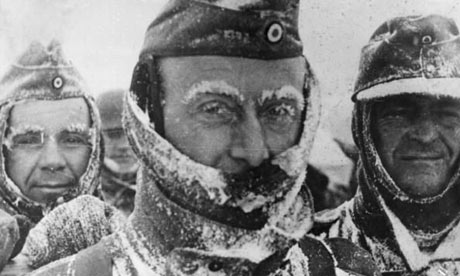"Left of the Boom" is a phrase that General McCrystal used recently in the 'Boots Off the Ground' panel discussed in my last post. I would like to discuss it as it applies to leadership. As an example I will use Operation Barbarossa, the German invasion of Russia in 1941, as an example. General McCrystal used it in the context of our response to IEDs when they were first used in Iraq. Initially the response to the threat posed by IEDs was to deploy armored vehicles and secure the area after one was detonated. This allowed us to evacuate casualties and potentially kill or capture any insurgents who might have stayed to create an ambush. However, this did not solve the real problem, IEDs were still killing soldiers, contractors, and civilians, slowing or stopping our convoys, and creating chaos in general.
The solution, General McCrystal said, was to "get ahead of the boom", stop the IEDs before they were detonated. Thus they instituted regular patrols, sniper teams conducting over watch, and other measures that prevented the IEDs from being deployed in the first place.
This is a large and important part of a leader's job. Great leaders must be able to look forward and identify incoming problems and stop them before they happen. This happens at two levels. First, executive leaders are positioned to see the big picture and make substantial changes thereto. In our example, Operation Barbarossa, the freezing cold of the Russian winter represents the 'boom'. German high command knew about the cold, but believed they could make ti to Moscow and defeat the Russian military before the cold effected them too much. Not only did they fail to set realistic goals, they had no contingency plans for if those goals failed. When those two are combined they are fatal. Getting left of the boom for them would have meant either, a) equipping their men and equipment to operate in the cold or b) developing a plan to fall back to prepared positions if the Russian forces remained unbeaten by a certain point.
However, while executive level leaders have the ability to influence the big picture, they often overlook details, or occasionally miss the big picture entirely., which is where mid to lower level leaders come in. It is their responsibility to make the big picture as described by the executive leader happen as best they can ad pass up bits of information or warnings when appropriate. Thus, while mid level leaders must have a general understanding of the big picture, their focus must be on the areas under their control. Lower levels of an organization are often tempted to waste time and energy complaining about the ineptitude of their commanders. While such complaints may often be valid, and valuable in their place, they are often unproductive. The German infantry officer who sent a few messages up the chain and then proceeded to train his men to deal with cold weather would ultimately have more impact than the officer who spent most of his energy complaining to or about higher.
So, take time to get above the crush and grind of now, the things immediately important. A little time each week looking ahead will go a long way to getting left of the boom for you and yours. Even if you are not at the top, getting you and your people out of trouble, even if it isn't as neat and tidy as if higher had done it, will still make a difference, which is what being a leader is all about.
image from The Guardian at http://www.theguardian.com/world/2009/sep/06/operation-barbarossa-russia-second-world-war

No comments:
Post a Comment